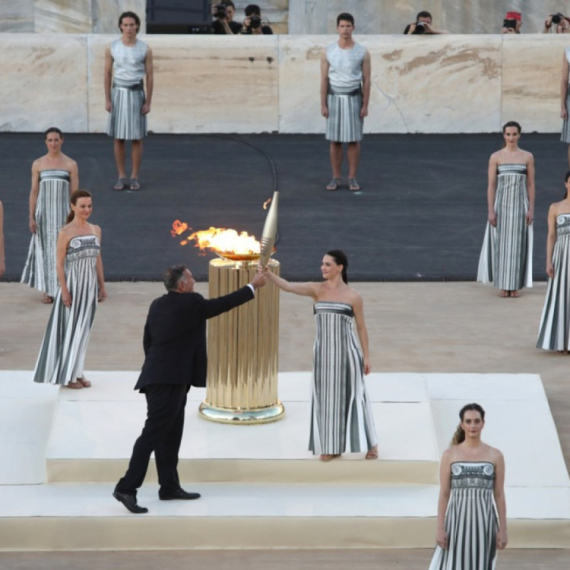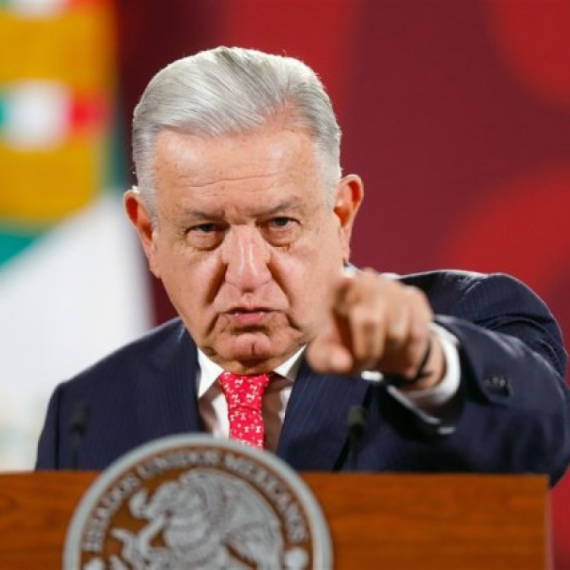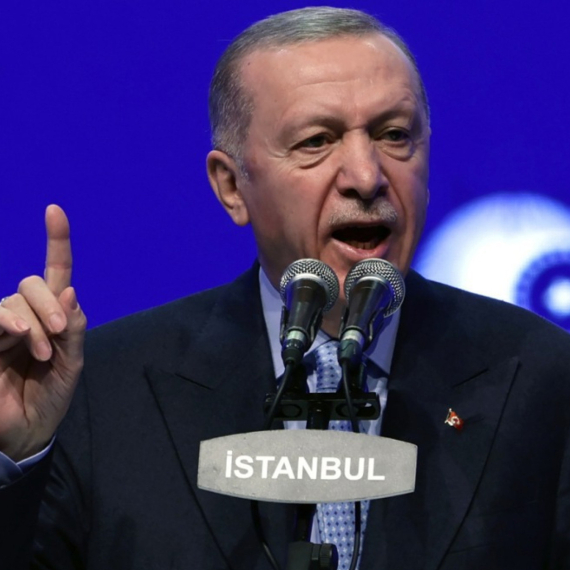Maybe yes, maybe no!
Friday, 05.03.2010.
23:19

Maybe yes, maybe no! No wonder, bearing in mind the fact that the entire media industry in Serbia is undergoing a great crisis, while advertising revenue often exceeds 80% of the entire annual revenue of Serbian newspapers. When it comes to TV and the web, advertising revenue quite often represents 100% of their overall income. The Serbian advertising market is quite a small one, with advertising prices being very low. State authorities, unlike those in other countries, have failed to provide any financial assistance to the media during the crisis, so it is quite normal that at the beginning of the writing of the draft law on advertising, the issue of financing RTS, a public service television that absorbs a chunk of the market share, popped up. We have tried to get a statement about this topic from newly-appointed President of Radio and Television of Serbia’s Programming Council Dragoljub Micunovic, but he declined. Hence, CorD is putting following question to the participants of our survey: “Should national television, in addition to revenue generated through subscription, earn money from broadcasting advertisements?” To avert misuse and pressure Jelena Drakulic, Director of Ringier d.o.o, Serbia: Rendering a public service while acting as commercial television involves two incompatible things. National television’s main source of financing should be through subscriptions, and money generated this way should be primarily directed towards science, educational, and cultural programs. National television could generate additional revenue by selling these, high-quality programs to commercial TV stations. In this way, possible misuse and pressure exerted by commercial advertisers on national television would be averted, while the required program quality that viewers pay for will be maintained. What’s the situation in the UK? Andrew Glass, Director of the British Council, Serbia: BBC domestic services don’t have advertising because of the universal license fee. BBC World TV has always been commercial and has always run on subscriptions and advertising (streaming has allowed them to develop ways of broadcasting news bulletins with a news agenda slightly more swayed to the region receiving it and it places relevant adverts for those markets). BBC World Service radio doesn’t carry ads because it’s paid for like the BC from a Foreign Office grant. BBC News Online uses IP addresses to recognize where you are in the world. If you’re in the UK, you don’t get ads or sponsored links, but internationally you do. This was to get around the argument that the license fee was being used to serve overseas audiences (News Online’s top audiences are UK, US, Canada). There are often tense relationships between the BBC and other commercial channels over competition and ‘unfair advantage’ allegations about the licence fee (especially because of the number of websites the BBC runs compared to others and BBC research and development in the technology field). There have always been questions raised around BBC’s Digital Channels, BBC 3 and 4, because not everyone can access them (although virtually everyone has Freeview now so this is less of an issue). Every time BBC faces cuts, these newer channels tend to be in the firing line. There are arguments around the BBC i-player too…..and whether you should pay to access it overseas and even in the UK if you don’t have a TV license. The landscape has changed so much over the last two to three decades. It was ‘simpler’ when you just had BBC and ITV! Channel 4 has a public service remit as well but no license fee (it funds itself through on-air advertising and other commercial activities). There’s often talk of BBC and C4 doing more together A Guardian/ICM poll 4 reported in the Guardian of 4 September 2009 stated: An overwhelming majority, 77%,, think BBC is an institution people should be proud of – up from 68% in an equivalent ICM poll carried out five years ago. Most (63%), also think it provides good value for money – up from 59% in 2004. Most people also question the continued need for the license fee, although support for it has risen over the last five years. Asked to pick from a range of ways of funding BBC, including the license fee, a subscription service and selling advertising, more people back the license fee than any alternative. TV market – EUR 95mn in 2009 Ivan Stankovic, President of Communis Agency: The question whether national television has the right to earn money from advertising as well as from subscriptions is, like many other issues in Serbia, a quite controversial one. There are two aspects to consider here – ideal and realistic. If we go by the first aspect, the ideal one, the answer would be ’No’. There is very straightforward logic behind this. National television is obligated to perform certain public functions, to cover certain areas that commercial TV stations cannot or don’t want to cover. Consequently, that is why the state is financing it and in return, the state holds national television accountable. Bearing this mind, why would national television need marketing in the first place? Taking into account the realistic aspect of this issue, the answer would be ‘Yes’. In this case, we need to consider the realistic situation as well. First, the state is not wealthy enough to provide financing for (yet another) public service, since we already have so many problems with the health system, education, poverty, and similar. Second, it seems that the state is having trouble thinking what principal interests national television should endorse. Considering the experiences so far, I am afraid that its main role would be to serve the ruling party and employ people recommended by that very same party, disregarding professionals who are actually best suited for the job (which is, currently, one of the biggest Serbian downfalls). In this way, speaking from a journalist’s point of view, national television would lose its independence. And we all remember what ‘Bastille’ television was like. There is also an ethical issue with spending the money earned from advertising. According to some estimates, the TV advertising market in Serbia was worth close to €95 million last year, with national television taking over €25 million. If they were to stop generating money from advertising, this would mean that the money would spill over to other commercial privately-owned TV stations. Who would then be able to withstand accusations that such a decision was made because of reasons other than ethical ones? Or maybe I am a bit crazy and naive? When I remember how many trains went by (Remember when the state bought those run-down Swedish trains, among a slew of other silly things?) and nobody raised an eyebrow. So, the answer to the question whether national television has the right to earn money from advertising in addition to charging subscription in line with the current situation that we find ourselves in is definitely MAYBE. Reality shows are not befitting national television Robert Coban, C.E.O. of Color Press Group: If the term "commercial programs" entails music shows, Hollywood movies, domestic series, and similar, then I agree that such programs should be broadcast on RTS, Radio and Television of Serbia. However, reality shows are not befitting national television. It is a real shame that every single TV station granted national frequency by the Republic Broadcasting Agency (RRA), whether commercial or RTS, has entirely deviated from what it stated in its national frequency application, although all stations were obligated by the RRA to adhere to their applications. There is another issue, that of the "dumping pricing" policy when it comes to TV advertising (in the case of RTS and commercial TV stations), and not adhering to the advertising time limit, which drastically erodes the advertising market while creating even more problems for the press which has now become too expensive to advertise in. If the print media were to reduce advertising prices, this would make them totally unprofitable, bearing in mind an overall drop in circulation figures and high production costs. Up to national television to decide Jelena Kolo, Head of PR in the Republic Broadcasting Agency (RRA): Financing a public broadcasting service is done in different ways – through TV subscription and commercialization of some programmes, a concept which many countries are accustomed to. According to Article 80 of the Law on Broadcasting, radio and television subscription is paid in order to finance activities of the institutions within the public broadcasting service directed towards accomplishing general public interest. In order to finance other activities, the institutions within the public broadcasting service generate funds by producing and broadcasting advertisements, producing and selling audio-visual programs (shows, films, series, audio media, and other), rendering other broadcasting services (like teletext), putting together concerts and other public events, and carrying out other activities stated in the Articles of Association, in accordance with relevant regulation. The Agency has no legal authority to deal with conceptual issues of financing national television or to draft laws that regulate this area. Source: CorD Drafting the new Press Law, which has begun in the Serbian Ministry of Trade and Services, has already aroused the interest of the Serbian media. Drafting the new Press Law, which has begun in the Serbian Ministry of Trade and Services, has already aroused the interest of the Serbian media.
Maybe yes, maybe no!
No wonder, bearing in mind the fact that the entire media industry in Serbia is undergoing a great crisis, while advertising revenue often exceeds 80% of the entire annual revenue of Serbian newspapers. When it comes to TV and the web, advertising revenue quite often represents 100% of their overall income.The Serbian advertising market is quite a small one, with advertising prices being very low. State authorities, unlike those in other countries, have failed to provide any financial assistance to the media during the crisis, so it is quite normal that at the beginning of the writing of the draft law on advertising, the issue of financing RTS, a public service television that absorbs a chunk of the market share, popped up. We have tried to get a statement about this topic from newly-appointed President of Radio and Television of Serbia’s Programming Council Dragoljub Mićunović, but he declined.
Hence, CorD is putting following question to the participants of our survey:
“Should national television, in addition to revenue generated through subscription, earn money from broadcasting advertisements?”
To avert misuse and pressure
Jelena Drakulić, Director of Ringier d.o.o, Serbia:Rendering a public service while acting as commercial television involves two incompatible things. National television’s main source of financing should be through subscriptions, and money generated this way should be primarily directed towards science, educational, and cultural programs. National television could generate additional revenue by selling these, high-quality programs to commercial TV stations. In this way, possible misuse and pressure exerted by commercial advertisers on national television would be averted, while the required program quality that viewers pay for will be maintained.
What’s the situation in the UK?
Andrew Glass, Director of the British Council, Serbia:BBC domestic services don’t have advertising because of the universal license fee. BBC World TV has always been commercial and has always run on subscriptions and advertising (streaming has allowed them to develop ways of broadcasting news bulletins with a news agenda slightly more swayed to the region receiving it and it places relevant adverts for those markets). BBC World Service radio doesn’t carry ads because it’s paid for like the BC from a Foreign Office grant.
BBC News Online uses IP addresses to recognize where you are in the world. If you’re in the UK, you don’t get ads or sponsored links, but internationally you do. This was to get around the argument that the license fee was being used to serve overseas audiences (News Online’s top audiences are UK, US, Canada).
There are often tense relationships between the BBC and other commercial channels over competition and ‘unfair advantage’ allegations about the licence fee (especially because of the number of websites the BBC runs compared to others and BBC research and development in the technology field).
There have always been questions raised around BBC’s Digital Channels, BBC 3 and 4, because not everyone can access them (although virtually everyone has Freeview now so this is less of an issue).
Every time BBC faces cuts, these newer channels tend to be in the firing line. There are arguments around the BBC i-player too…..and whether you should pay to access it overseas and even in the UK if you don’t have a TV license. The landscape has changed so much over the last two to three decades. It was ‘simpler’ when you just had BBC and ITV! Channel 4 has a public service remit as well but no license fee (it funds itself through on-air advertising and other commercial activities). There’s often talk of BBC and C4 doing more together
A Guardian/ICM poll 4 reported in the Guardian of 4 September 2009 stated: An overwhelming majority, 77%,, think BBC is an institution people should be proud of – up from 68% in an equivalent ICM poll carried out five years ago. Most (63%), also think it provides good value for money – up from 59% in 2004.
Most people also question the continued need for the license fee, although support for it has risen over the last five years. Asked to pick from a range of ways of funding BBC, including the license fee, a subscription service and selling advertising, more people back the license fee than any alternative.
TV market – EUR 95mn in 2009
Ivan Stanković, President of Communis Agency:The question whether national television has the right to earn money from advertising as well as from subscriptions is, like many other issues in Serbia, a quite controversial one. There are two aspects to consider here – ideal and realistic. If we go by the first aspect, the ideal one, the answer would be ’No’. There is very straightforward logic behind this. National television is obligated to perform certain public functions, to cover certain areas that commercial TV stations cannot or don’t want to cover. Consequently, that is why the state is financing it and in return, the state holds national television accountable. Bearing this mind, why would national television need marketing in the first place?
Taking into account the realistic aspect of this issue, the answer would be ‘Yes’. In this case, we need to consider the realistic situation as well. First, the state is not wealthy enough to provide financing for (yet another) public service, since we already have so many problems with the health system, education, poverty, and similar.
Second, it seems that the state is having trouble thinking what principal interests national television should endorse. Considering the experiences so far, I am afraid that its main role would be to serve the ruling party and employ people recommended by that very same party, disregarding professionals who are actually best suited for the job (which is, currently, one of the biggest Serbian downfalls). In this way, speaking from a journalist’s point of view, national television would lose its independence. And we all remember what ‘Bastille’ television was like.
There is also an ethical issue with spending the money earned from advertising. According to some estimates, the TV advertising market in Serbia was worth close to €95 million last year, with national television taking over €25 million. If they were to stop generating money from advertising, this would mean that the money would spill over to other commercial privately-owned TV stations. Who would then be able to withstand accusations that such a decision was made because of reasons other than ethical ones? Or maybe I am a bit crazy and naive? When I remember how many trains went by (Remember when the state bought those run-down Swedish trains, among a slew of other silly things?) and nobody raised an eyebrow.
So, the answer to the question whether national television has the right to earn money from advertising in addition to charging subscription in line with the current situation that we find ourselves in is definitely MAYBE.
Reality shows are not befitting national television
Robert Čoban, C.E.O. of Color Press Group:If the term "commercial programs" entails music shows, Hollywood movies, domestic series, and similar, then I agree that such programs should be broadcast on RTS, Radio and Television of Serbia. However, reality shows are not befitting national television. It is a real shame that every single TV station granted national frequency by the Republic Broadcasting Agency (RRA), whether commercial or RTS, has entirely deviated from what it stated in its national frequency application, although all stations were obligated by the RRA to adhere to their applications.
There is another issue, that of the "dumping pricing" policy when it comes to TV advertising (in the case of RTS and commercial TV stations), and not adhering to the advertising time limit, which drastically erodes the advertising market while creating even more problems for the press which has now become too expensive to advertise in. If the print media were to reduce advertising prices, this would make them totally unprofitable, bearing in mind an overall drop in circulation figures and high production costs.
Up to national television to decide
Jelena Kolo, Head of PR in the Republic Broadcasting Agency (RRA):Financing a public broadcasting service is done in different ways – through TV subscription and commercialization of some programmes, a concept which many countries are accustomed to. According to Article 80 of the Law on Broadcasting, radio and television subscription is paid in order to finance activities of the institutions within the public broadcasting service directed towards accomplishing general public interest.
In order to finance other activities, the institutions within the public broadcasting service generate funds by producing and broadcasting advertisements, producing and selling audio-visual programs (shows, films, series, audio media, and other), rendering other broadcasting services (like teletext), putting together concerts and other public events, and carrying out other activities stated in the Articles of Association, in accordance with relevant regulation.
The Agency has no legal authority to deal with conceptual issues of financing national television or to draft laws that regulate this area.
Source: CorD
















































Komentari 0